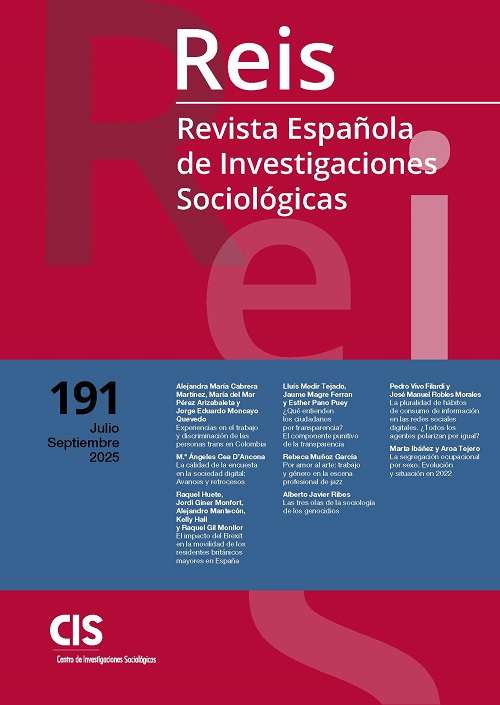What do Citizens Understand by Transparency? The Punitive Component of Transparency
DOI:
https://doi.org/10.5477/cis/reis.191.63-80Keywords:
Trust, Local Government,, Implementation, TransparencyAbstract
This work sheds light on the determinants of citizens' conception of transparency. Based on theoretical analysis and empirical evidence from focus groups and citizen surveys, the results confirm that citizens with lower levels of institutional trust view transparency as a policy for controlling governments. The causal hypothesis of transparency policies assumes that their fundamental goal is to increase citizen trust in the functioning of political institutions. However, if willingness to control and low prior trust are found to be determinants of citizens' understanding of transparency, the explanations for the origins of transparency policies may vary, opening up new, less optimistic avenues for interpreting the actual effects of transparency on citizens.
Downloads
References
Ballester, Adrián. (2015). «Administración Electrónica, Transparencia y Open Data como generadores de confianza en las Administraciones Públicas». Telos: Cuadernos de comunicación e innovación, 100: 120-126.
Brown, Alexander J.; Vandekerckhove, Wim y Dreyfus, Suelette. (2014). The relationship between transparency, whistleblowing, and public trust. En: P. Ala’i y R. G. Vaughn (ed.). Research Handbook on Transparency (pp. 30-58). Cheltenham/Camberley/Northampton: Edward Elgar Publishing.
Byung-Chul, Han (2013). La sociedad de la transparencia. Barcelona: Herder.
Castellanos, Jorge (2022). «Transparencia y participación ciudadana: la lucha contra la corrupción como eje vertebrador del proceso democrático». Revista Española de la Transparencia, (15): 107-129.
Cotterrell, Roger (1999). «Transparency, mass media, ideology and community». Journal for Cultural Research, 3(4): 414-426.
Cucciniello, Maria; Porumbescu, Gregory A. y Grimmelikhuijsen, Stephan (2017). «25 years of transparency research: Evidence and future directions». Public Administration Review, 77(1): 32-44.
Dabbagh Rollán, Víctor Omar (2016). «La Ley de Transparencia y la corrupción. Aspectos generales y percepciones de la ciudadanía española». Aposta. Revista de Ciencias Sociales, (68): 83-106.
Dragos, Dacian C.; Kovač, Polonca y Marseille, Albert T. (eds.) (2019). The laws of transparency in action: A European perspective. Cham: Palgrave Macmillan.
Etzioni, Amitai (2016). Is transparency the best disinfectant?. Disponible en https://papers.ssrn.com/sol3/papers.cfm?abstract_id=2731880, acceso 23 de septiembre 2023.
Etzioni, Amitai (2018). The limits of transparency. En: E. Alloa y T. Dieter (eds.). Transparency, society and subjectivity (pp. 179-201). Cham: Palgrave Macmillan.
Erkkilä, Tero (2012). Government transparency: Impacts and unintended consequences. Heidelberg/New York: Springer.
Fox, Jonathan (2007) «The uncertain relationship between transparency and accountability». Development in practice, 17.4-5: 663-671.
Grimmelikhuijsen, Stephan G. (2010). «Transparency of public decision‐making: towards trust in local government?». Policy & Internet, 2(1): 5-35.
Grimmelikhuijsen, Stephan G. y Welch, Eric W. (2012). «Developing and testing a theoretical framework for computer‐mediated transparency of local governments». Public Administration Review, 72(4): 562-571.
Grimmelikhuijsen, Stephan; Porumbescu, Gregory; Hong, Boram e Im, Tobin (2013). «The effect of transparency on trust in government: A cross‐national comparative experiment». Public Administration Review, 73(4): 575-586.
Hood, Christopher (2010). «Accountability and transparency: Siamese twins, matching parts, awkard couple?». West European Politics, 33(5): 989-1009.
Hood, Christopher y Heald, David (2006). «Transparency: The key to better governance?». Series: Proceedings of the British Academy, 135. Oxford: Oxford University Press for The British Academy.
Mabillard, Vincent y Pasquier, Martial (2015). «Transparency and trust in government: A two-way relationship». Yearbook of Swiss Administrative Sciences, (6): 23-34. doi: 10.5334/ssas.78
Mabillard, Vincent y Pasquier, Martial (2016). «Transparency and trust in government (2007-2014): A comparative study». NISPAcee Journal of Public Administration and Policy, 9(2): 69-92.
Magre, Jaume; Medir, Lluís; Pano, Esther; Vallbé, Joan-Josep y Martínez-Alonso, José Luis (2021). La Implementación y los efectos de la normativa de transparencia en los Gobiernos locales de mayor población. Madrid: Instituto Nacional de Administraciones Públicas.
Medir, Lluís; Pano, Esther; Vallbé, Joan-Josep y Magre, Jaume (2021). «La implementación de las políticas de transparencia en los municipios españoles de mayor población: ¿path dependency o shock institucional?». Gestión y Análisis de Políticas Públicas, 27: 6-29.
Meijer, Albert (2013). «Understanding the complex dynamics of transparency». Public Administration Review, 73(3): 429-439.
Michener, Gregory (2019). «Gauging the impact of transparency policies». Public Administration Review, 79(1): 136-139.
Nozick, Robert (2014). Anarquía, Estado y utopía. New York: Editorial Innisfree.
O'neill, Onora (2002). A question of trust: The BBC Reith Lectures 2002. Cambridge: Cambridge University Press.
Parent, Michael; Vandebeek, Christine. A. y Gemino, Andrew C. (2005). «Building citizen trust through e-government». Government Information Quarterly, 22(4): 720-736.
Piotrowski, Suzanne J. y Ryzin, Gregg Van G. (2007). «Citizen attitudes toward transparency in local government». The American Review of Public Administration, 37(3): 306-323.
Pozen, David E. (2020). «Seeing transparency more clearly». Public Administration Review, 80(2): 326-331.
Roberts, Alasdair (2006). Blacked out: Government secrecy in the information age. Cambridge University Press.
Roberts, Alasdair (2015). Transparency in government. En: T. Bovaird y E. Loeffler (eds.). Public Management and Governance. London: Routledge.
Villoria, Manuel (2015). «Ética en las administraciones públicas: de los principios al marco institucional». Pertsonak eta Antolakunde Publikoak Kudeatzeko Euskal Aldizkaria, Revista Vasca de Gestión de Personas y Organizaciones Públicas (9): 8-17.
Villoria, Manuel (2019). «El reto de la transparencia». Anuario de Transparencia Local 2018, 1: 15-41. Madrid: Fundación Democracia y Gobierno Local.
Villoria, Manuel (2021). «¿Qué condiciones favorecen una transparencia pública efectiva?». Revista de Estudios Políticos (194): 213-247.
Villoria, Manuel e Izquierdo, Agustín (2015). Ética pública y buen gobierno. Madrid: Tecnos.
Downloads
Published
How to Cite
Issue
Section
License
Copyright (c) 2024 Revista Española de Investigaciones Sociológicas

This work is licensed under a Creative Commons Attribution-ShareAlike 4.0 International License.
Permite Compartir — copiar y redistribuir el material en cualquier medio o formato, Adaptar — remezclar, transformar y construir a partir del material para cualquier propósito, incluso comercialmente.








